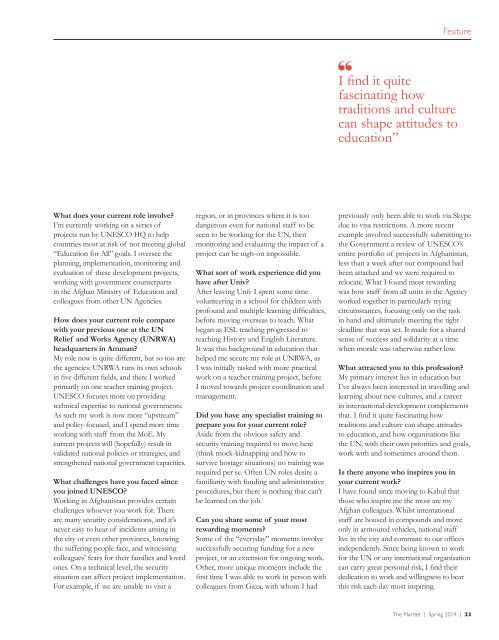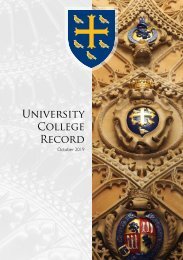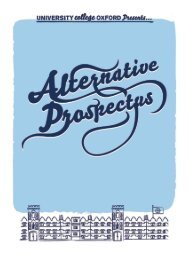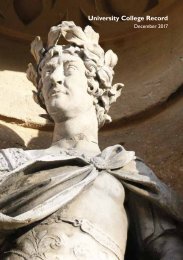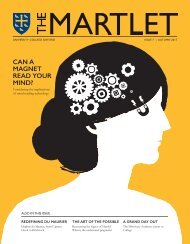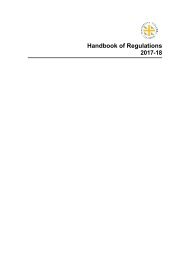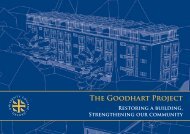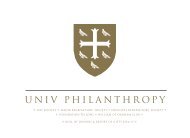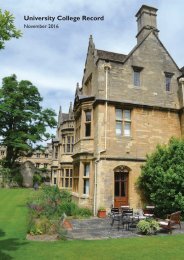The Martlet - Spring 2019
University College Oxford - The Martlet - Spring 2019
University College Oxford - The Martlet - Spring 2019
You also want an ePaper? Increase the reach of your titles
YUMPU automatically turns print PDFs into web optimized ePapers that Google loves.
Feature<br />
I find it quite<br />
fascinating how<br />
traditions and culture<br />
can shape attitudes to<br />
education”<br />
What does your current role involve?<br />
I’m currently working on a series of<br />
projects run by UNESCO HQ to help<br />
countries most at risk of not meeting global<br />
“Education for All” goals. I oversee the<br />
planning, implementation, monitoring and<br />
evaluation of these development projects,<br />
working with government counterparts<br />
in the Afghan Ministry of Education and<br />
colleagues from other UN Agencies.<br />
How does your current role compare<br />
with your previous one at the UN<br />
Relief and Works Agency (UNRWA)<br />
headquarters in Amman?<br />
My role now is quite different, but so too are<br />
the agencies; UNRWA runs its own schools<br />
in five different fields, and there I worked<br />
primarily on one teacher training project.<br />
UNESCO focuses more on providing<br />
technical expertise to national governments.<br />
As such my work is now more “upstream”<br />
and policy-focused, and I spend more time<br />
working with staff from the MoE. My<br />
current projects will (hopefully) result in<br />
validated national policies or strategies, and<br />
strengthened national government capacities.<br />
What challenges have you faced since<br />
you joined UNESCO?<br />
Working in Afghanistan provides certain<br />
challenges whoever you work for. <strong>The</strong>re<br />
are many security considerations, and it’s<br />
never easy to hear of incidents arising in<br />
the city or even other provinces, knowing<br />
the suffering people face, and witnessing<br />
colleagues’ fears for their families and loved<br />
ones. On a technical level, the security<br />
situation can affect project implementation.<br />
For example, if we are unable to visit a<br />
region, or in provinces where it is too<br />
dangerous even for national staff to be<br />
seen to be working for the UN, then<br />
monitoring and evaluating the impact of a<br />
project can be nigh-on impossible.<br />
What sort of work experience did you<br />
have after Univ?<br />
After leaving Univ I spent some time<br />
volunteering in a school for children with<br />
profound and multiple learning difficulties,<br />
before moving overseas to teach. What<br />
began as ESL teaching progressed to<br />
teaching History and English Literature.<br />
It was this background in education that<br />
helped me secure my role at UNRWA, as<br />
I was initially tasked with more practical<br />
work on a teacher training project, before<br />
I moved towards project coordination and<br />
management.<br />
Did you have any specialist training to<br />
prepare you for your current role?<br />
Aside from the obvious safety and<br />
security training required to move here<br />
(think mock-kidnapping and how to<br />
survive hostage situations) no training was<br />
required per se. Often UN roles desire a<br />
familiarity with funding and administrative<br />
procedures, but there is nothing that can’t<br />
be learned on the job.<br />
Can you share some of your most<br />
rewarding moments?<br />
Some of the “everyday” moments involve<br />
successfully securing funding for a new<br />
project, or an extension for ongoing work.<br />
Other, more unique moments include the<br />
first time I was able to work in person with<br />
colleagues from Gaza, with whom I had<br />
previously only been able to work via Skype<br />
due to visa restrictions. A more recent<br />
example involved successfully submitting to<br />
the Government a review of UNESCO’s<br />
entire portfolio of projects in Afghanistan,<br />
less than a week after our compound had<br />
been attacked and we were required to<br />
relocate. What I found most rewarding<br />
was how staff from all units in the Agency<br />
worked together in particularly trying<br />
circumstances, focusing only on the task<br />
in hand and ultimately meeting the tight<br />
deadline that was set. It made for a shared<br />
sense of success and solidarity at a time<br />
when morale was otherwise rather low.<br />
What attracted you to this profession?<br />
My primary interest lies in education but<br />
I’ve always been interested in travelling and<br />
learning about new cultures, and a career<br />
in international development complements<br />
that. I find it quite fascinating how<br />
traditions and culture can shape attitudes<br />
to education, and how organisations like<br />
the UN, with their own priorities and goals,<br />
work with and sometimes around them.<br />
Is there anyone who inspires you in<br />
your current work?<br />
I have found since moving to Kabul that<br />
those who inspire me the most are my<br />
Afghan colleagues. Whilst international<br />
staff are housed in compounds and move<br />
only in armoured vehicles, national staff<br />
live in the city and commute to our offices<br />
independently. Since being known to work<br />
for the UN or any international organisation<br />
can carry great personal risk, I find their<br />
dedication to work and willingness to bear<br />
this risk each day most inspiring.<br />
<strong>The</strong> <strong>Martlet</strong> | <strong>Spring</strong> <strong>2019</strong> | 23


